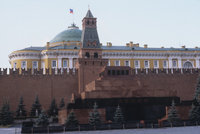Mikhail Gorbachev vs. USSR. What about Russia?
 Former Soviet President Mikhail Gorbachev with amazing seriousness stated the obvious, summarizing his statements with shocking conclusions. The headline in Deutsche Welle: "Gorbachev warned Russians on the return to the Soviet past" is quite telling. The ex-president of the superpower warns his fellows against the country he ran and sworn allegiance to.
Former Soviet President Mikhail Gorbachev with amazing seriousness stated the obvious, summarizing his statements with shocking conclusions. The headline in Deutsche Welle: "Gorbachev warned Russians on the return to the Soviet past" is quite telling. The ex-president of the superpower warns his fellows against the country he ran and sworn allegiance to.
Mikhail Gorbachev in an interview with German weekly Der Spiegel said that the ruling party in Russia is more like the Communist Party and is pulling the country into the past. On Monday this was reported by Deutsche Welle, stating that the interview is devoted to the 20th anniversary of the collapse of the Soviet Union. "20 years after the collapse of the Soviet Union, Mikhail Gorbachev warns of a possible return to the past," the newspaper reported on its website.
This would have been acceptable if Mikhail Gorbachev had not perceived this development negatively. In his view, the ruling party "United Russia", headed by Prime Minister Vladimir Putin, now resembles the Communist Party. "They want to drag us into the past, while the country is in dire need of modernization," said Gorbachev to Der Spiegel.
In fact, a certain similarity (albeit somewhat virtual) of the "United Russia" and the Communist Party is that extreme banality. The ruling party designed to seal the vertical of power formed in the first decade of the 2000s with horizontal connections is often called "the Communist Party without ideology."
Barack Obama becomes USA's Gorbachev
The penetration of the political party into the executive branch and binding of its element is not exceptional. In the end, there is nothing unique here on a large scale. The negative connotation is manifested precisely in this addition: "without ideology." For we are talking about the lack of the fundamentally important element that would bond and define the goals and objectives.
It is unclear what kind of modernization Gorbachev is talking about. Apparently, not only about economic, otherwise he would not be mentioning the Communist Party. However, it is difficult not to notice that if a great goal had appeared in the mid-2000s, the country would have resolutely rushed forward. This could have been a space program with the landing on the moon and the creation of the Russian lunar base.
But such a goal is an ideology that leads to the political modernization and setting on the economic modernization.
It seems, however, that the ex-general secretary of the CPSU Gorbachev sees political modernization through the prism of the widest, pluralistic multi-party system- just like Academician Sakharov. Hopefully, he does not see Russia - just like Sakharov did - divided into hundreds of small states. After all, the person who held the top post of one of the two world superpowers should know history and understand that the widest pluralistic multiparty system in Russia brought the most terrible disasters - from the troubled times of dual power in February of 1917 to the disaster of 1991.
It's not up to Gorbachev to speak of democracy
Perhaps these historical examples are telling somehow? It does not necessarily have to do with the "special path of Russia," it has to do with the absence of such very broad pluralist democracy anywhere in the world.
What is the return to the "past days" that the ex-Soviet president warns the Russians against? Hopefully, he is not talking about the highest, according to the international standards, social protection, guaranteed employment and state pensions? Or about the level of education and mass free health coverage for the citizens? Or about the times of lower level crime, alcoholism, and drug addiction? All of this, not without the help of Mikhail Gorbachev, was lost while switching from a socialist to a capitalist formation.
"The Past" for the ex-president is the existence of the ruling party. Japan, Norway, Turkey, Korea and many other countries around the world would be surprised to learn that they live in "the past".
Among his mistakes as head of the Soviet state, Gorbachev in an interview named the following: "I have failed to timely disband the Communist Party." This is an extremely interesting approach to political competition - destroying one of the competitors. However, the situation was not affected by the fact that the Communist Party was not disbanded "timely". The consequences are well known.
What is the model that Mikhail Gorbachev suggests for today's Russia?
Anton Ponomarev
Pravda.Ru
Subscribe to Pravda.Ru Telegram channel, Facebook, RSS!





